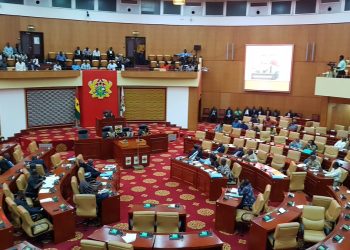Policy Analyst, Bright Simons, has revealed that Ghana had exited its previous International Monetary Fund (IMF) programme prematurely.
According to him, the government had failed to meet sure structural benchmarks which have been required to full the programme in 2019 and as an alternative had opted for waivers, assuring the IMF that it might meet these benchmarks exterior of the programme, independently.
Unfortunately, all however two of the structural benchmarks weren’t met, Bright Simons said.
Ghana had signed up for a three-year IMF Extended Credit Facility in 2015 to fill a $930m gaping gap within the economic system.
On exiting the programme in 2019, the Finance Minister, Ken Ofori-Atta had said that the government’s early exit from the programme was proof of the NPP’s superior administration of the country’s funds.
Speaking on JoyNews’ PM Express, Bright Simons said, “On the IMF entrance we all know the large drawback was that we exited the IMF prematurely. When we glance at once we have been exiting in 2019, the Finance Minister insists that we left as a result of the IMF gave us an all clear. Not actually.
“We left as a result of we requested for waivers and the IMF can’t pressure us to be in an IMF programme, we’re a sovereign country. Waives or these waivers we requested for is on the fact that we had not accomplished the programme as a result of structural benchmarks had not been met that are all fiscal issues that we hadn’t handled however we went to IMF and said that issues have been going to enhance as a result of we have been going to produce 1billion barrels of oil in a day and so forth so we wish out, and the IMF allowed us out.
“It wasn’t because we left the IMF programme on a clean bill, actually when you look through the programme targets particularly the structural ones most of them were not met and the few that were met, the two that were met, were met with substantial delays.
Should the IMF settle for Ghana’s bid to subscribe to a programme, this may be the 17th time since Independence Ghana would have subscribed to an IMF programme.
Some policy analysts have warned that this may in all probability not be the final time Ghana seeks a bailout from the IMF, citing the country’s historical past of fiscal indiscipline and profligate spending.
One of such analysts is Professor Bopkin of the University of Ghana who says the failure of successive governments to undertake prudent measures to stabilize the economic system is the explanation for the present harsh financial house the country finds itself in.
“This is not the last time we will be going to the IMF. We have failed as a country to successfully do the needful- to say these are the necessary fiscal reforms we need to pride ourselves as a nation that won independence in 1957,” he said on the Super Morning Show, on July 6, 2022.










Discussion about this post